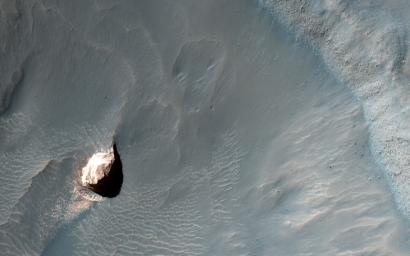
|
Small Crater within Pollack Crater Containing Light-Toned Material
- Click the image above for a larger view
- Full-Res JPEG (2880 x 1800) (665.2 kB)
- Full-Res TIFF (2880 x 1800) (15.6 MB)
Caption:
This observation shows a small crater in within the much larger Pollack Crater containing light-toned material. Pollack Crater is a 90-kilometer diameter impact crater first imaged by the Mariner 9 spacecraft.
This material was first observed by the THEMIS team, and there are multiple Context Camera and Mars Orbiter Camera images showing that this light-toned material may be similar to the large "White Rock" outcrop to the northwest. HiRISE has also imaged White Rock several times. In these cases, we can see how different teams can work together to get an interesting image at high resolution for further study.
Background Info:
HiRISE is one of six instruments on NASA's Mars Reconnaissance Orbiter. The University of Arizona, Tucson, operates the orbiter's HiRISE camera, which was built by Ball Aerospace & Technologies Corp., Boulder, Colo. NASA's Jet Propulsion Laboratory, a division of the California Institute of Technology in Pasadena, manages the Mars Reconnaissance Orbiter Project for the NASA Science Mission Directorate, Washington.
Cataloging Keywords:
| Name | Value | Additional Values |
|---|---|---|
| Target | Mars | |
| System | ||
| Target Type | Planet | |
| Mission | Mars Reconnaissance Orbiter (MRO) | Mariner, Mars Global Surveyor (MGS) |
| Instrument Host | Mars Reconnaissance Orbiter | Mars Global Surveyor |
| Host Type | Orbiter | Flyby Spacecraft |
| Instrument | High Resolution Imaging Science Experiment (HiRISE) | Mars Orbiter Camera (MOC) |
| Detector | ||
| Extra Keywords | Color, Crater, Impact | |
| Acquisition Date | ||
| Release Date | 2013-08-21 | |
| Date in Caption | ||
| Image Credit | NASA/JPL-Caltech/Univ. of Arizona | |
| Source | photojournal.jpl.nasa.gov/catalog/PIA17639 | |
| Identifier | PIA17639 | |
